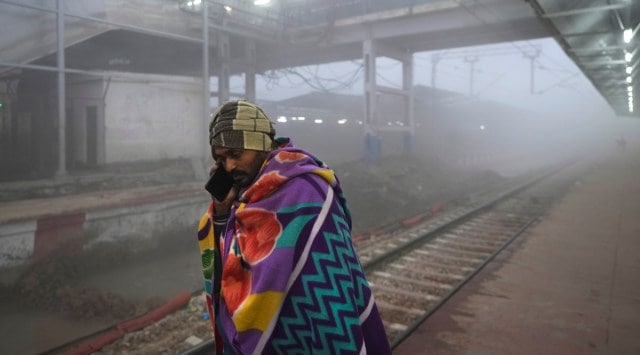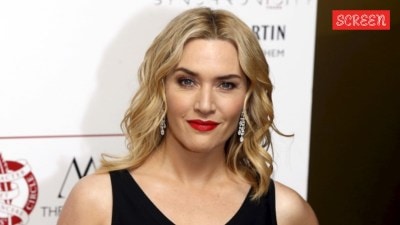📣 For more lifestyle news, click here to join our WhatsApp Channel and also follow us on Instagram
Winter health: Experts share dos and don’ts on how to stay protected from the cold wave
Look for signs of hypothermia, which are low body temperature, uncontrolled shivering, memory loss, disorientation incoherence, slurred speech, drowsiness and exhaustion
 A person talks on his phone as he waits for his train in Varanasi. North India is reeling under heavy fog, disrupting rail, road and air transport. (AP Photo/Rajesh Kumar Singh)
A person talks on his phone as he waits for his train in Varanasi. North India is reeling under heavy fog, disrupting rail, road and air transport. (AP Photo/Rajesh Kumar Singh) Winters are merciless in many parts of the country, especially in the northern belt, where fog occurrences and chilly winds are frequent, leading to a drop in visibility, and low body temperature. It should be kept in mind that for people who are leaving their house for work, sufficient precaution should be taken in terms of clothes, so as to reduce exposure to the cold. Inadequate layering, among other things, can make you susceptible to seasonal illnesses.
On Twitter, the National Disaster Management Authority (NDMA) shared a health advisory, writing, “To stay warm during a cold wave, make sure to follow these dos and don’ts”. According to it,
* Be aware of alerts on newspapers, radio, television and mobile phone
* Stock food, water and other necessities
* Stock forage for livestock
* Limit exposure to cold and stay in a warm place
* Cover your head, neck, hands and feet to prevent heat loss
* Cover your mouth to protect the lungs
* Do not stay in wet clothes as it can be “deadly”; change immediately
* Drink hot beverages to prevent dehydration and to maintain body heat
* Avoid alcohol
* Look for signs of hypothermia, which are low body temperature, uncontrolled shivering, memory loss, disorientation incoherence, slurred speech, drowsiness and exhaustion
* Look for signs of frostbite, which are pale fingers, toes, earlobes and tip of nose
#ColdWave | To stay warm during a cold wave, make sure to follow these dos and don’ts 👇 pic.twitter.com/6It48Tz3rw
— NDMA India | राष्ट्रीय आपदा प्रबंधन प्राधिकरण 🇮🇳 (@ndmaindia) December 21, 2022
The NDMA advised to call an ambulance if one has any of these symptoms.
Additionally, Dr Ravi Shekhar Jha, director – pulmonology, Fortis Escorts Hospital Faridabad shared an advisory explaining the risk factors and preventive measures for a healthy respiratory system. According to him, venturing out in the freezing temperature exerts pressure on the heart and lungs; cold air can cause cough, running nose, sore throat, and headaches.
The doctor said that to prevent a health hazard, do the following:
1. Abstain from smoking. Even passive smoking poses a risk during the cold winter months.
2. Avoid exposure to pollution, smog, vehicular fumes, dust etc.
3. Limit your outdoor activities and indulge in exercise.
4. Keep a tab on the Air Quality Index (AQI).
5. Wear a mask when going out, particularly in crowded places.
6. Those above 55 years of age should get themselves vaccinated for influenza and pneumonia.
7. Consume a balanced diet and keep yourself hydrated.
8. Watch out for dampness and mold in the house.
9. Take respiratory medicines regularly.
Dr N R Shetty, consultant, internal medicine, Kokilaben Dhirubhai Ambani Hospital Mumbai told indianexpress.com that during the cold season, one can get protection with warmers like scarves, hand gloves, and sweaters to “regulate the body’s core temperature”. “One should also wear covered footwear in places where the cold is extreme, especially to avoid frost bites. Avoid smoking as it can increase the risk of asthma or even heart attacks in people with pre-existing conditions,” the doctor warned, adding that one must avoid drinking cold water.
“Prevent hypothermia by using warm blankets and heaters. To keep the skin healthy and hydrated, moisturisers can be used. Vitamin D levels decrease during winter, try to maintain this through enough sunlight exposure and also consume supplements, if recommended by a doctor,” he said.
Dr Bharat Agarwal, consultant, internal medicine, Apollo hospitals Navi Mumbai concurred. He stated that one can wear a cap to cover the ears if they are exposed to the cold breeze. “If predisposed to respiratory infections, get your vaccination against influenza and pneumococcal. Reduce alcohol intake as it predisposes to hypothermia,” he concluded.
📣 For more lifestyle news, follow us on Instagram | Twitter | Facebook and don’t miss out on the latest updates!
📣 For more lifestyle news, click here to join our WhatsApp Channel and also follow us on Instagram
- 01
- 02
- 03
- 04
- 05



























